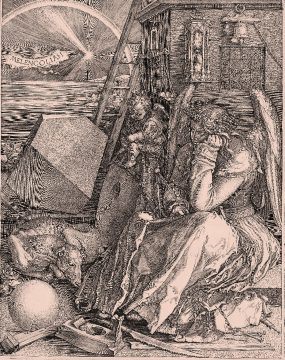Christopher S. Wood at Artforum:
 ACCORDING TO AN ANCIENT TEXT attributed to Aristotle, black bile “can induce paralysis or torpor or depression or anxiety when it prevails in the body; but if it is overheated it produces cheerfulness, bursting into song, and ecstasies and the eruption of sores and the like.” Such “fits of exaltation” were believed to be conducive to creative achievement. “Maracus, the Syracusan,” the text tells us, “was actually a better poet when he was out of his mind.” The aesthetes of the Renaissance and the Romantic era were equally convinced of the natural link between melancholy and creativity. In As You Like It, Shakespeare’s philosophical idler Jaques, savoring his own moodiness, boasts, “I can suck melancholy out of a song as a weasel sucks eggs.” To this day, the notion persists that spleen, ennui, depression, and even madness might be correlated with genius—or, at the very least, with an artistic sensibility.
ACCORDING TO AN ANCIENT TEXT attributed to Aristotle, black bile “can induce paralysis or torpor or depression or anxiety when it prevails in the body; but if it is overheated it produces cheerfulness, bursting into song, and ecstasies and the eruption of sores and the like.” Such “fits of exaltation” were believed to be conducive to creative achievement. “Maracus, the Syracusan,” the text tells us, “was actually a better poet when he was out of his mind.” The aesthetes of the Renaissance and the Romantic era were equally convinced of the natural link between melancholy and creativity. In As You Like It, Shakespeare’s philosophical idler Jaques, savoring his own moodiness, boasts, “I can suck melancholy out of a song as a weasel sucks eggs.” To this day, the notion persists that spleen, ennui, depression, and even madness might be correlated with genius—or, at the very least, with an artistic sensibility.
Saturn and Melancholy: Studies in the History of Natural Philosophy, Religion, and Art (1964) tracks the fortunes of this idea across two thousand years.
more here.
